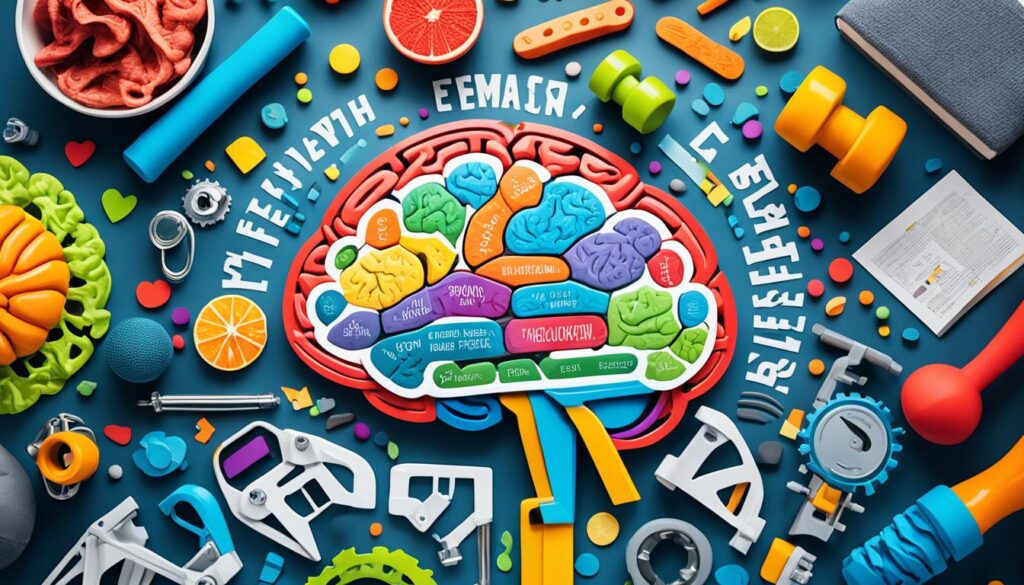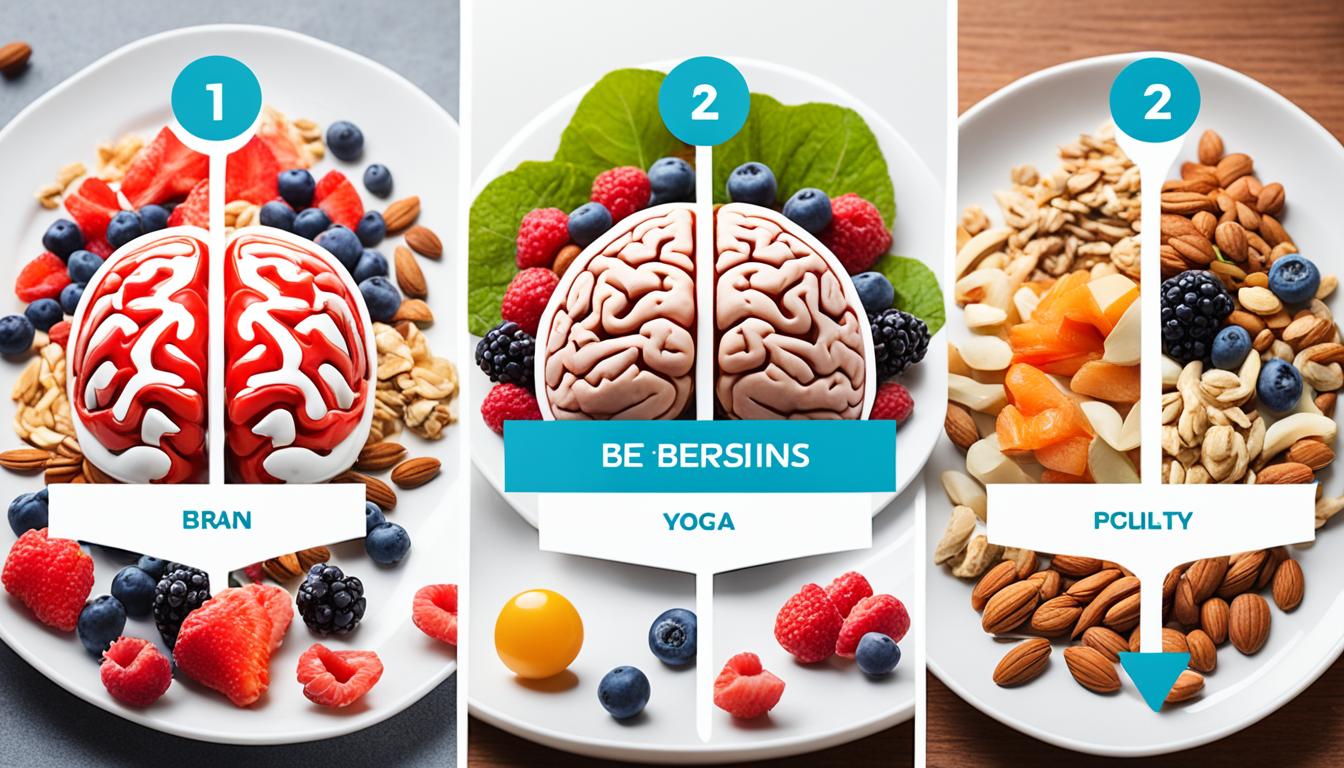Did you know that every 3 seconds, someone in the world develops dementia? With the increasing prevalence of cognitive decline and its impact on individuals and their families, it’s crucial to take proactive steps in preventing cognitive decline and protecting the health of our brain. In this article, we will explore six ways to lower dementia risk and protect your brain.
By implementing these lifestyle changes and habits, you can take charge of your brain health and reduce the chances of developing cognitive decline. Let’s dive in!
Key Takeaways:
- Implementing lifestyle changes and habits can lower the risk of dementia and protect brain health.
- Regular physical exercise plays a crucial role in dementia prevention.
- Nutrition and a balanced diet contribute to optimal brain health.
- Mental stimulation, cognitive exercises, and intellectual engagement delay cognitive decline.
- Managing stress and prioritizing quality sleep are essential for brain health.
Understanding Dementia and Alzheimer’s
In this section, we will provide an overview of dementia and Alzheimer’s disease, including the key differences between them. We will also discuss the different types of dementia, their symptoms, and the importance of early detection for effective management.
What is Dementia vs Alzheimer’s?
Dementia and Alzheimer’s disease are often used interchangeably, but they are not the same. Dementia is an umbrella term that refers to a group of cognitive disorders characterized by memory loss, impaired thinking, and changes in behavior. Alzheimer’s disease is the most common form of dementia, accounting for approximately 60-80% of all cases. It is a progressive brain disorder that causes a decline in memory, thinking, and reasoning skills.
Types of Dementia Explained
There are several types of dementia, each with its own characteristics and causes. Some of the most common types include:
- Alzheimer’s disease
- Vascular dementia
- Lewy body dementia
- Frontotemporal dementia
- Parkinson’s disease dementia
Each type of dementia has unique symptoms and progression patterns, making an accurate diagnosis crucial for appropriate management and care.
Dementia Symptoms and Early Detection
The symptoms of dementia can vary depending on the type and stage of the disease. Common signs of dementia include:
- Memory loss
- Difficulty with language and communication
- Confusion and disorientation
- Impaired judgment and decision-making
- Changes in mood and behavior
Early detection of dementia is vital for early intervention and access to appropriate treatment and support. If you or a loved one are experiencing any of the above symptoms, it is important to consult a healthcare professional for a proper evaluation.
| Type of Dementia | Characteristics |
|---|---|
| Alzheimer’s Disease | Progressive decline in memory and cognitive function. |
| Vascular Dementia | Caused by reduced blood flow to the brain, resulting in cognitive impairment. |
| Lewy Body Dementia | The presence of abnormal protein deposits in the brain, leading to memory loss and motor symptoms. |
| Frontotemporal Dementia | Degeneration of the frontal and temporal lobes of the brain, causing changes in behavior and personality. |
| Parkinson’s Disease Dementia | Associated with Parkinson’s disease, characterized by movement problems and cognitive decline. |
Unpacking Neuroprotective Habits
In this section, we will explore the impact of lifestyle choices on cognitive health and provide practical brain-boosting strategies that can be incorporated into daily routines. It is important to cultivate neuroprotective habits to lower the risk of dementia and promote brain health.
The Impact of Lifestyle on Cognitive Health
Our daily habits have a profound effect on our cognitive health. Engaging in activities that stimulate the brain and promote overall well-being can help reduce the risk of dementia. By adopting healthy lifestyle choices, individuals can enhance cognitive function and maintain their brain’s health as they age.
Brain-Boosting Strategies for Daily Routine
Several brain-boosting strategies can be easily incorporated into daily routines. By integrating these habits into our lives, we can support cognitive function and reduce the likelihood of developing dementia. Here are seven habits to avoid dementia:
- Engage in regular physical exercise
- Maintain a balanced and nutritious diet
- Get quality sleep
- Participate in intellectually stimulating activities like reading, puzzles, or learning a new skill
- Manage stress effectively through relaxation techniques
- Maintain social connections and engage in meaningful relationships
- Monitor and manage chronic conditions like hypertension and diabetes
Additionally, the number one way to reduce dementia risk is to engage in lifelong learning activities. Continuous intellectual engagement, such as learning new skills or pursuing higher education, has been shown to have a protective effect on cognitive health.
By adopting these neuroprotective habits into your daily routine, you can take proactive steps towards reducing the risk of dementia and promoting a healthy brain.
Optimal Nutrition for Brain Health
To support brain health and optimize cognitive function, it is essential to prioritize nutrition and provide the body with the necessary nutrients and vitamins. A well-balanced diet plays a crucial role in promoting memory improvement and overall brain health.
Essential Nutrients and Vitamins for Cognitive Function
Several nutrients and vitamins have been identified as important for maintaining optimal cognitive function. These include:
- Omega-3 fatty acids: Found in walnuts, and flaxseeds, omega-3 fatty acids are known to support brain health and improve memory.
- Vitamin B12: Essential for neurological function, vitamin B12 can be obtained from sources such as fortified cereals, yogurt, low-fat milk, nutritional yeast and dairy products.
- Antioxidants: Fruits and vegetables rich in antioxidants, such as berries, leafy greens, and colorful vegetables, help reduce oxidative stress and promote brain health.
- Vitamin E: Found in nuts, seeds, and vegetable oils, vitamin E is known for its antioxidant properties and its role in protecting brain cells.
- Curcumin: Derived from turmeric, curcumin has anti-inflammatory properties that may protect against cognitive decline.
By incorporating these essential nutrients and vitamins into your diet, you can support cognitive function and improve your memory.
Memory Improvement Techniques Through Diet
In addition to incorporating the essential nutrients and vitamins mentioned above, there are specific memory improvement techniques that can be achieved through diet. These techniques include:
- Mediterranean Diet: Following a Mediterranean-style diet, which includes foods such as fish, whole grains, fruits, vegetables, and olive oil, has been associated with better cognitive function and a lower risk of dementia.
- Limiting Added Sugars: High sugar intake has been linked to cognitive decline. By reducing the consumption of added sugars, you can support brain health and memory.
- Hydration: Staying adequately hydrated is essential for optimal brain function. Make sure to drink enough water throughout the day to support cognitive performance.
- Herbs and Spices: Certain herbs and spices, such as rosemary and sage, have been found to enhance memory and cognitive function. Incorporating these into your cooking can provide a flavorful boost to your brain health.
By implementing these memory improvement techniques through diet, you can enhance your cognitive abilities and support long-term brain health.

| Essential Nutrients and Vitamins | Food Sources |
|---|---|
| Omega-3 fatty acids | Walnuts, flaxseeds |
| Vitamin B12 | fortified cereals, yogurt, low-fat milk, nutritional yeast & dairy products |
| Antioxidants | Berries, leafy greens, colorful vegetables |
| Vitamin E | Nuts, seeds, vegetable oils |
| Curcumin | Turmeric |
Physical Exercise as a Cornerstone of Dementia Prevention
When it comes to reducing the risk of Alzheimer’s disease and other forms of dementia, regular physical exercise plays a crucial role. Engaging in physical activity not only benefits our physical health but also has a profound impact on our cognitive well-being.
Studies have consistently shown that exercise can help to:
- Improve blood circulation to the brain, delivering essential nutrients and oxygen that support brain health.
- Reduce the risk of cardiovascular diseases, such as heart disease and stroke, which are known to increase the likelihood of developing dementia.
- Promote neuroplasticity, the brain’s ability to adapt and form new connections, which is key to maintaining cognitive function.
- Enhance mood and reduce stress, both of which can positively impact cognitive health.
“Physical exercise is not only good for your heart but also your brain. It can help reduce the risk of dementia by improving blood flow and supporting neuroplasticity.”
– Dr. Sarah Johnson, Neurologist
Engaging in a variety of exercises is beneficial for brain health. Incorporating aerobic activities, such as brisk walking, cycling, or swimming, can improve cardiovascular fitness and enhance brain function. Strength training exercises, like weightlifting or yoga, can help maintain muscle mass and flexibility, contributing to overall physical and cognitive well-being.
It’s important to find activities that you enjoy and can maintain consistently. Aim for at least 150 minutes of moderate-intensity aerobic exercise or 75 minutes of vigorous exercise per week, along with strength training exercises twice a week. Remember, every little bit counts, and even small increments of physical activity throughout the day can make a difference in reducing your risk of dementia.

Six Ways To Lower Dementia Risk And Protect Your Brain
In this section, we will revisit the six ways to lower dementia risk and protect the brain, emphasizing the importance of early intervention and the potential to slow down the progression of dementia when detected early.
“Early intervention is key when it comes to dementia. By detecting the signs and symptoms early on, we can take proactive steps to slow down the progression of the disease and protect the health of our brains.”
Here are the six ways to lower dementia risk:
- 1. Maintain a Healthy Diet: A well-balanced diet rich in fruits, vegetables, whole grains, lean proteins, and healthy fats can help support brain health and reduce the risk of dementia.
- 2. Exercise Regularly: Engaging in physical activity, such as brisk walking, swimming, or dancing, can improve blood flow to the brain, promote neuroplasticity, and lower the risk of cognitive decline.
- 3. Stay Mentally Active: Engaging in intellectually stimulating activities, such as puzzles, reading, or learning a new skill, can help maintain cognitive function and slow down dementia progression.
- 4. Manage Chronic Conditions: Taking steps to manage conditions like diabetes, high blood pressure, and obesity can reduce the risk of developing dementia.
- 5. Get Quality Sleep: Prioritizing restful and uninterrupted sleep can support brain health and cognitive function, reducing the risk of dementia.
- 6. Lead a Socially Active Life: Maintaining strong social connections and participating in social activities can provide cognitive stimulation, and emotional support, and reduce the risk of isolation-related cognitive decline.
By incorporating these strategies into our daily lives, we can significantly lower the risk of dementia and protect the health of our brains. Remember, early intervention is crucial, so if you notice any signs or symptoms of cognitive decline, consult with a healthcare professional for a proper evaluation and personalized guidance.
| Strategy | Benefits |
|---|---|
| Maintain a Healthy Diet | – Provides essential nutrients for brain health – Reduces inflammation – Supports overall well-being |
| Exercise Regularly | – Improves blood flow to the brain – Enhances neuroplasticity – Reduces cognitive decline risk |
| Stay Mentally Active | – Stimulates cognitive function – Delays dementia progression – Enhances memory and problem-solving skills |
| Manage Chronic Conditions | – Reduces dementia risk – Supports overall health – Enhances quality of life |
| Get Quality Sleep | – Supports brain restoration – Enhances cognitive function – Reduces dementia risk |
| Lead a Socially Active Life | – Improves mental and emotional well-being – Provides cognitive stimulation – Reduces isolation-related cognitive decline |

By following these six strategies and maintaining a proactive approach to brain health, we can reduce the risk of dementia and enjoy a higher quality of life as we age. Remember, it is never too early to start taking care of our brains. The choices we make today can have a significant impact on our cognitive health in the future.
Mental Stimulation and Cognitive Exercises
Mental stimulation and cognitive exercises are essential for maintaining cognitive health. Engaging in activities that challenge the brain can provide neuroprotective benefits and help delay cognitive decline. Puzzles, games, and continuous learning are particularly effective in keeping the mind sharp and resilient.
Puzzles, Games, and Learning as Neuroprotective Activities
One of the most enjoyable ways to stimulate the brain is by solving puzzles and playing various games. Whether it’s a crossword puzzle, Sudoku, or a challenging board game, these activities require critical thinking, problem-solving, and memory retrieval. Regularly participating in puzzles and games can help strengthen cognitive abilities and promote brain health.
In addition to puzzles and games, continuous learning is also an excellent way to engage the mind and protect against cognitive decline. Acquiring new knowledge, exploring different subjects, and engaging in intellectually stimulating activities such as reading, writing, or learning a musical instrument can all contribute to cognitive vitality.
“The mind is like a muscle; it needs regular exercise to stay strong and resilient. Engaging in puzzles, games, and continuous learning can provide the mental stimulation necessary for maintaining cognitive health.”
How Intellectual Engagement Can Delay Cognitive Decline
Intellectual engagement plays a significant role in delaying cognitive decline. When we actively challenge our brains, we promote the growth and connectivity of neurons, which helps build cognitive reserve. Cognitive reserve refers to the brain’s ability to adapt and withstand age-related changes and damages. By consistently engaging in intellectually stimulating activities, we can enhance cognitive reserve and potentially delay the onset of cognitive decline.
Furthermore, intellectual engagement can also improve cognitive flexibility, attention span, and information processing speed. These cognitive skills are crucial for managing everyday tasks, problem-solving, and maintaining overall cognitive function.

| Puzzles and Games | Benefits |
|---|---|
| Crossword puzzles | Enhances vocabulary, memory, and problem-solving skills. |
| Sudoku | Improves logic, attention to detail, and critical thinking. |
| Board games | Promotes social interaction, strategic thinking, and decision-making. |
Engaging in puzzles, games, and continuous learning is not only enjoyable but also helps keep our minds sharp, improves cognitive function, and may contribute to delaying cognitive decline. Incorporating these neuroprotective activities into our daily routines can have long-term benefits for our overall cognitive health.
Managing Stress and its Effects on the Brain
Chronic stress can have detrimental effects on brain health. When we experience stress, our bodies release cortisol, a hormone that helps us deal with stressful situations. However, excessive or prolonged release of cortisol can damage the brain, leading to a range of cognitive problems.
Stress can impair memory, attention, and decision-making skills. It can also increase the risk of mental health disorders such as anxiety and depression, which further impact brain function. Additionally, chronic stress can contribute to the development and progression of neurodegenerative diseases, including dementia.
To protect our brains and reduce the risk of dementia, it is crucial to effectively manage stress. Here are some strategies that can help:
- Exercise: Engaging in regular physical activity can reduce stress levels and promote the production of endorphins, which are natural mood boosters.
- Practice relaxation techniques: Techniques like deep breathing, meditation, and mindfulness can help calm the mind and reduce stress.
- Get enough sleep: Adequate and quality sleep is essential for stress reduction and overall brain health.
- Engage in enjoyable activities: Engaging in hobbies, spending time with loved ones, and participating in activities that bring joy and relaxation can effectively reduce stress levels.
- Seek support: Talking to a trusted friend, family member, or therapist can provide emotional support and help manage stress more effectively.
- Prioritize self-care: Taking care of our physical and emotional well-being through healthy eating, regular self-care routines, and setting boundaries can significantly reduce stress levels.
The effects of stress on the brain are significant. By managing stress effectively, we can protect our brain health and reduce the risk of cognitive decline and dementia.
Remember, it is essential to identify and address stressors in our lives to maintain optimal brain function and overall well-being.
| Stress Management Strategies | Benefits |
|---|---|
| Exercise | Reduces stress levels, promotes mood regulation |
| Relaxation techniques | Calms the mind, decreases stress hormones |
| Quality sleep | Enhances stress resilience, supports brain health |
| Engaging in enjoyable activities | Provides stress relief, promotes overall well-being |
| Seeking support | Offers emotional support, fosters stress management skills |
| Prioritizing self-care | Improves overall well-being, reduces stress levels |
Quality Sleep and Dementia Risk Reduction
Adequate and quality sleep is essential for overall health, including brain health. Numerous studies have highlighted the strong connection between sleep and cognitive function, showing that a lack of sleep can increase the risk of developing dementia.
During sleep, the brain undergoes essential restorative processes that are crucial for memory consolidation, learning, and overall brain health. Disrupted sleep patterns have been associated with an increased accumulation of beta-amyloid plaques, a hallmark of Alzheimer’s disease, in the brain.
Getting enough high-quality sleep improves cognitive abilities and enhances memory. It also helps regulate mood and emotions, reduces stress levels, and promotes overall well-being. By prioritizing sleep, individuals can significantly reduce their risk of dementia.
Sleep is the golden chain that ties health and our bodies together. – Thomas Dekker
To optimize the quality of your sleep, consider following these tips:
- Create a relaxing bedtime routine that includes winding down activities like reading, taking a warm bath, or practicing relaxation techniques.
- Avoid stimulating activities, such as excessive screen time, close to bedtime.
- Maintain a consistent sleep schedule, going to bed and waking up at the same time every day, even on weekends.
- Create a sleep-friendly environment by keeping your bedroom dark, quiet, and at a comfortable temperature.
- Avoid consuming caffeine or alcohol close to bedtime, as these substances can disrupt sleep patterns.
- Engage in regular physical activity, but try to complete strenuous exercise at least a few hours before bedtime.
By implementing these strategies and prioritizing quality sleep, individuals can reduce their risk of dementia and promote optimal brain health.
Regular Health Check-Ups and Early Intervention
Regular health check-ups and early intervention play a critical role in managing and reducing the impact of dementia. By closely monitoring dementia signs and obtaining an early diagnosis, individuals can take proactive steps to slow down the progression of the disease.
The Importance of Monitoring Dementia Signs
Monitoring dementia signs is key to early detection and intervention. Common signs include memory loss, difficulty with familiar tasks, confusion, and changes in mood or behavior. It is important to be vigilant and alert to these signs, as they can provide valuable clues about the presence of dementia.
Regular check-ups with healthcare professionals can assist in the identification of these signs, enabling them to conduct further assessments and evaluations if needed. By closely monitoring dementia signs, healthcare providers can formulate appropriate interventions and treatment plans to help individuals manage the disease.
How Early Diagnosis Can Slow Down Dementia Progression
Early diagnosis of dementia offers several benefits, including the opportunity to slow down the progression of the disease. When dementia is detected early, healthcare providers can develop personalized care plans to address the specific needs of the individual.
Early intervention allows for the implementation of various strategies and treatments to support cognitive function and overall brain health. These may include cognitive therapy, medication management, lifestyle modifications, and social engagement. By taking action early on, individuals with dementia can have a better chance of maintaining their independence and quality of life for a longer period.
Dementia Treatment: Supporting Brain Health Through Medical Interventions
When it comes to dementia, medical interventions play a crucial role in supporting brain health and managing symptoms. In this section, we will explore current dementia treatments and research, as well as the role of medication and therapy in symptom management.
Understanding Current Dementia Treatments and Research
Researchers and healthcare professionals are continuously working to develop new treatments and therapies for dementia. These advancements aim to improve the quality of life for individuals living with dementia and offer hope to their loved ones.
Current dementia treatments focus on managing symptoms and slowing down the progression of the disease. Some of the common treatment options include:
- Medications: Certain medications can help manage cognitive symptoms, such as memory loss and confusion, in individuals with dementia. These medications work by regulating neurotransmitters and improving brain function.
- Therapy: Various forms of therapy, such as cognitive training, can help individuals with dementia improve their cognitive abilities and retain their independence for as long as possible. Additionally, speech therapy and occupational therapy can assist in enhancing communication and daily living skills.
- Supportive Care: Supportive care focuses on providing comfort, assistance, and emotional support to individuals with dementia and their caregivers. This type of care aims to improve quality of life and ensure a safe and supportive environment.
How Medication and Therapy Can Manage Symptoms
Medication and therapy can effectively manage the symptoms associated with dementia and improve the overall well-being of individuals with the condition.
Medication can help address cognitive symptoms, such as memory loss and confusion, by regulating brain chemicals and neurotransmitters. These medications may slow down the progression of the disease and improve cognitive function.
Therapy, on the other hand, offers non-pharmacological approaches to managing symptoms. Cognitive training helps individuals with dementia sharpen their cognitive skills and maintain independence. Speech therapy can improve communication abilities, while occupational therapy focuses on enhancing daily living skills.
It’s important to note that dementia treatment plans are highly individualized and may involve a combination of medication, therapy, and supportive care. Consultation with healthcare professionals is crucial to determine the most appropriate treatment approach based on an individual’s specific needs and condition severity.
Conclusion
In conclusion, it is clear that early intervention and lifestyle changes play a crucial role in slowing down the progression of dementia. By implementing the strategies outlined in this article, individuals can actively reduce their risk and protect their brain health.
One of the most important takeaways from this discussion is the question: “Can you slow down dementia if caught early?” The answer is a resounding yes. Detecting dementia in its early stages allows for timely intervention, which can significantly impact the course of the disease. Engaging in neuroprotective habits, maintaining optimal nutrition, staying physically and mentally active, managing stress, prioritizing quality sleep, and seeking regular health check-ups are all key components of a comprehensive approach to dementia prevention and management.
While there may not be a foolproof way to completely prevent dementia, the power of lifestyle choices and early intervention cannot be underestimated. By prioritizing brain health and implementing these strategies, individuals can take control of their well-being and potentially slow down the progression of dementia. Remember, every step you take towards protecting your brain health matters.
FAQ
What are some effective strategies to lower the risk of dementia?
There are six effective strategies that can help lower the risk of dementia and protect brain health. These include maintaining a healthy lifestyle, exercising regularly, engaging in mental stimulation, managing stress, prioritizing quality sleep, and undergoing regular health check-ups.
What is the difference between dementia and Alzheimer’s?
Dementia is an umbrella term for a group of symptoms characterized by a decline in cognitive functioning. Alzheimer’s disease is the most common cause of dementia and involves progressive memory loss and cognitive decline.
What are the different types of dementia?
There are several types of dementia, including Alzheimer’s disease, vascular dementia, Lewy body dementia, and frontotemporal dementia. Each type has its own distinct symptoms and underlying causes.
What are the signs of dementia? How can early detection help?
Common signs of dementia include memory loss, difficulty with language and communication, confusion, and changes in mood and behavior. Early detection is crucial as it allows for early intervention and the implementation of strategies to slow down the progression of the disease.
What are the seven habits to avoid dementia?
The seven habits to avoid dementia include staying mentally and socially active, engaging in regular physical exercise, eating a healthy diet, managing chronic conditions, getting enough sleep, quitting smoking, and limiting alcohol consumption.
What is the number one way to reduce dementia risk?
The number one way to reduce dementia risk is by adopting a healthy and active lifestyle. This includes maintaining a balanced diet, exercising regularly, engaging in mental stimulation, managing stress, and getting quality sleep.
How can puzzles, games, and continuous learning delay cognitive decline?
Puzzles, games, and continuous learning provide mental stimulation that can help build and strengthen neural connections in the brain. By challenging the brain through these activities, individuals can delay cognitive decline and maintain better cognitive function.
How does chronic stress affect brain health?
Chronic stress can have detrimental effects on brain health. It can lead to the shrinkage of the hippocampus, impair memory and cognitive function, and increase the risk of developing dementia. Effective stress management techniques are essential for maintaining brain health.
How does sleep impact the risk of dementia?
Adequate and quality sleep plays a vital role in brain health. It allows the brain to rest, repair, and consolidate memories. Poor sleep has been linked to an increased risk of cognitive decline and dementia. Prioritizing sleep can help reduce the risk of dementia.
How important are regular health check-ups and early intervention for dementia?
Regular health check-ups and early intervention are crucial for managing dementia. Regular monitoring of dementia signs allows for early detection and the implementation of strategies to slow down the progression of the disease. Early diagnosis can help in developing a personalized treatment plan.
How are dementia symptoms treated? Are there any available medications or therapies?
While there is no cure for dementia, symptoms can be managed through various treatments. Medications may be prescribed to help manage cognitive symptoms, behavioral changes, and sleep problems. Additionally, therapy, such as cognitive stimulation therapy and occupational therapy, can help support brain health and improve quality of life.




